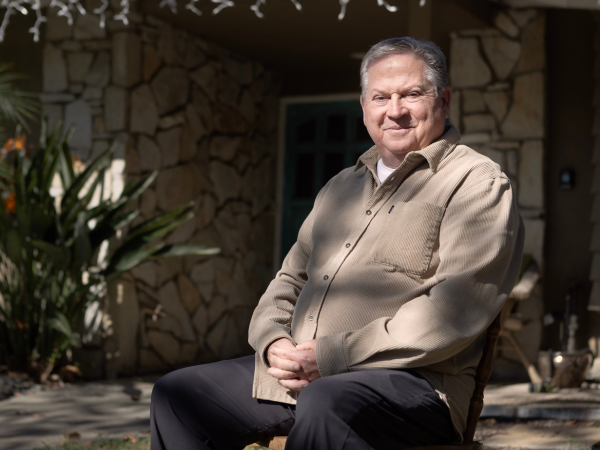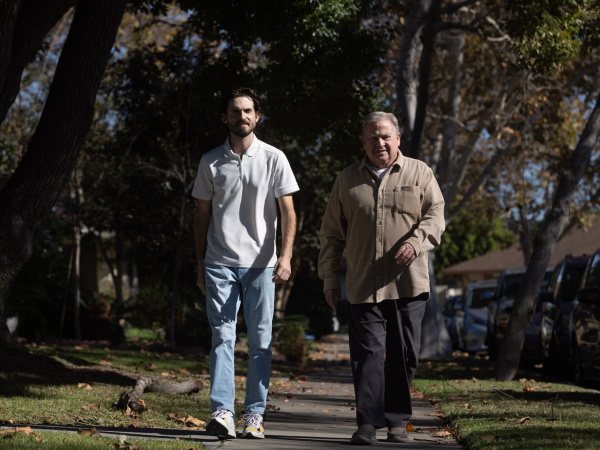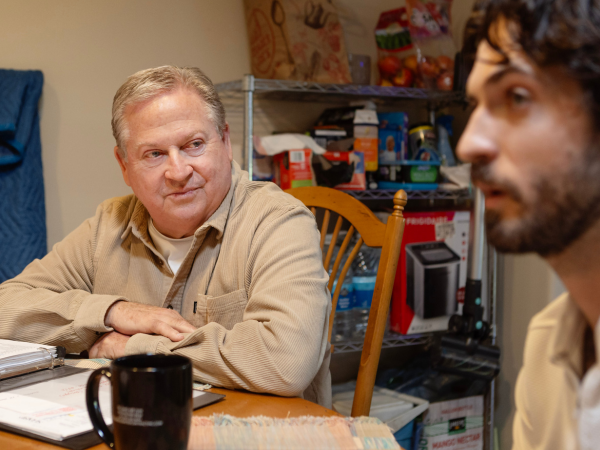John “Jay” Horan sits at his kitchen table, a thick black binder in front of him.
A few years ago, the binder would have contained materials for his construction manager job: in-depth charts about the timing of deliverables, budget breakdowns, and the like.
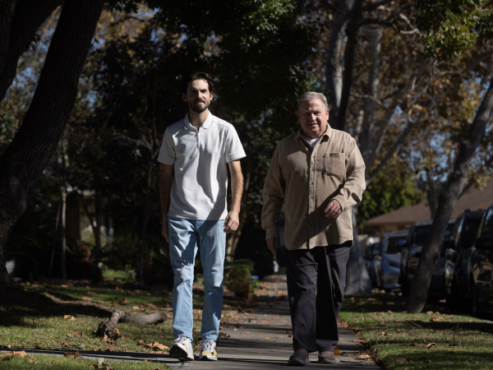
COLIN HORAN AND HIS FATHER JAY HORAN TAKE A WALK IN FULLERTON ON NOV. 17. PHOTOS BY DREW KELLEY/DIOCESE OF ORANGE
Now it’s filled with medical documents.
In June 2020, Horan, now 66, was diagnosed with end-stage renal (kidney) failure, news he said “dumbfounded” him.
Besides having previously undergone an appendectomy and back surgery, he had been in good health – or so he thought.
He went to see a doctor after suffering some falls at commercial construction sites after his fatigued legs gave out.
A BIG ASK
It took Horan a few frustrating months before he ended up at St. Joseph Hospital in Orange and finally got a diagnosis.
It also took him a lot of soul-searching to go public with his dream of finding a live kidney donor.
“It’s just that asking someone to donate a kidney isn’t the easiest thing to do,” said Horan.
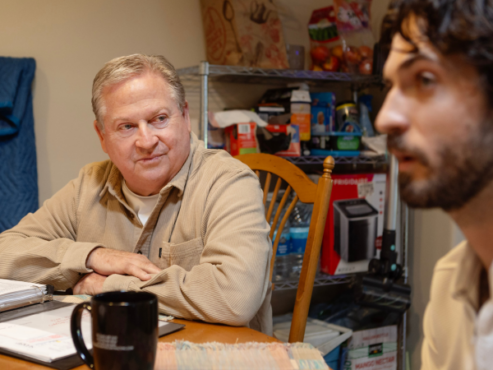
JAY HORAN AND HIS SON COLIN HORAN RECOUNT JAY’S STRUGGLES WITH END-STAGE RENAL FAILURE.
In fact, according to medical literature his doctor provided, more than half of all people in need of a kidney transplant do not even ask one person to donate.
“I never once thought, ‘Why me?’” Horan said of being on dialysis treatment for the last 3 ½ years. And while dialysis is a treatment, it is not a cure.
Instead, Horan turned to his faith and prayer for comfort and guidance.
“I’ve been dealt a curveball – now I’m trying to hit it,” said Horan, a state-licensed architect for 36 years who studied the subject at Cal State Polytechnic University, Pomona.
FATHER AND SON
Transplants from living donors offer the best odds for longer, healthier lives for kidney recipients, and reduce the six- to 10-year waiting period for a kidney from a deceased donor to just months with the help of a living donor.
Horan’s son, Colin, 27, put his San Francisco career on hold and returned home to Orange County to provide support and care for his father after first coming down to help his ailing grandmother.
Horan’s two adult daughters, Katin and Alana, who live locally, have also been a big support.
“Family comes first,” Colin said. “Work will always be there, and I’m young. I can always build my career.”
For the eight years leading up to her death last Thanksgiving at age 96, Mary Horan – Jay’s mother and Colin’s grandmother – was on dialysis.
Horan and his son lived and took care of her in her Tustin home. For over two years, Horan and his mother underwent dialysis together.
Following her death, he and Colin moved into their home in Santa Ana and started attending St. John the Baptist Catholic Church.
Being parishioners there now for only nine months, Horan has been hesitant to reach out to the congregation until he is a bit more familiar with them.
LIFELONG CATHOLICS
The Horans are lifelong Catholics.
Born in Evanston, Ill., Jay was a small child when his family relocated to Southern California. He attended St. Cecilia School in Tustin, and his three children grew up attending Our Lady of Fatima Catholic School in San Clemente. All of Horan’s children were baptized at Mission Basilica in San Juan Capistrano.
Some things in life, of course, are priceless: for example, his three children and his first granddaughter, who turns 1 soon. Horan’s older brother is Fr. Gerald “Jerry” Horan, a Servite priest and former principal of Servite High School and former superintendent of Catholic schools for the Diocese of Orange.
ONE KIDNEY IS ENOUGH
Overall, donating a kidney is considered safe. As with all surgeries, there is risk involved. But a person can live a full and healthy life with just one kidney.
Horan’s Medicare insurance would cover all costs to potential donors; the plan covers 100% of testing, hospitalization, medical and lab work for donor evaluation. The hospitalization for the donor is expected to be brief, typically one to two days.
Horan added: “It would mean the world to me and my family to extend my life.”
If you or someone you know is willing to consider this life-changing act, or to learn more about living kidney donation, contact Colin Horan, email [email protected] or call (949) 385-3823. For more information about organ donors and kidney donors, visit organdonor.gov/ and kidney.org

